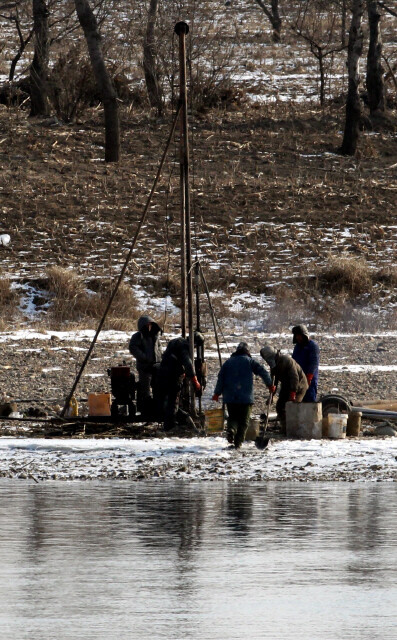hankyoreh
Links to other country sites 다른 나라 사이트 링크
Blaming Kim Jung-il, though well intended, could be untimely

By Kim Kyu-won, Staff Writer
A diplomatic gaffe may have been committed by a Cheong Wa Dae official on Thursday when they said, “Ultimate responsibility for the Cheonan and Yeonpyeong Island incidents lies with the North Korean National Defense Commission chairman, Kim Jong-il.”
Originally, the statement was one that said the South was willing to improve North-South relations which had been strained since the sinking of the Cheonan and the shelling of Yeonpyeong. The South Korean government was hoping for a fresh start with the beginning of vice-chairman’s Kim Jong-un’s rule. It is highly likely that shifting the blame onto Kim Jong-il could provoke North Korea.
“It’s good that the government is using this incident to improve its policy towards North Korea,” said Professor Kim Geun-sik of Kyungnam University. He added, however, “Bringing up Chairman Kim Jong-il’s responsibility during his funeral period, however, could provoke both the North Korean leadership and its people.”
Others are judging the comment based on the grounds that the North has a patriarchal political system where dead rulers still rule by injunction. “It is impossible to separate the authority and responsibility of Kim Jong-un from those of his forbears because the North is a country where the teachings of Premier Kim Il-Sung and Chairman Kim Jong-il are continuously observed,” said University of North Korean Studies professor Yang Moo-jin. “Blaming the deceased for something during the funeral period is something that wll be hard to accept, emotionally speaking.” National Intelligence Service director Won Sei-hoon’s statement that “There is no trace of movement by Chairman Kim Jong-il’s private train, in Pyongyang,” is also one that could provoke the North.
Experts analysis concludes that such problems are due to a lack of North Korean policy control tower in the Lee Myung-bak government. “During the Roh Moo-hyun government, the National Security Council mediated opinions on North Korea and ensured consistency,” said Dongguk University professor Kim Yong-hyeon. “The authority and functions of such bodies must be reinforced again.”
Meanwhile, Uriminzokkiri, the website of North Korea’s Committee for the Peaceful Reunification of Korea, an organization in charge of policies towards South Korea, claimed in a commentary article “We are observing the attitude of the South Korean authorities,” that, in terms of fraternity, traditional custom and human morality, a condolence visit was “a clear duty.” Regarding Unification Minister Yu Woo-ik's remarks of condolence on Tuesday, when Yu said, “We send consolation to the people of North Korea,” Uriminzokkiri objected, saying, “[This statement] revealed impure thoughts by disavowing 'formal condolences' and 'expression of condolences' and talking of sending consolation to the people. This is an unacceptable insult to and mockery of our dignity.” The site claimed, “If [the South Korean government] doesn't want the situation to get worse, it must stop blocking condolence visits by South Korean groups and citizens, and the authorities must observe natural etiquette, too.”
Yu, however, confirmed the existing policy, saying, “We are not considering additional increases in condolences.”
Despite this, the Korean Council for Reconciliation and Cooperation has decided to put together a delegation and plans to enter into discussions with the government. The South Korean Committee for the Realization of the June 15 Joint Declaration, too, has begun constituting a delegation to offer condolences, while the National Council of Churches in Korea plans to apply to the government to send a delegation to North Korea.
Discussions between representatives of Lee Hee-ho, the widow of former president Kim Dae-jung, and the government on the formation of a civilian delegation have still not made progress after three days. Lee's representatives say they will include former unification minister Lim Dong-won and former Democratic Party leader Park Jie-won in the delegation, but the government refuses to make yield from its position that “politicians are not allowed.”
Please direct questions or comments to [englishhani@hani.co.kr]
Editorial・opinion
![[Column] Season 2 of special prosecutor probe may be coming to Korea soon [Column] Season 2 of special prosecutor probe may be coming to Korea soon](https://flexible.img.hani.co.kr/flexible/normal/500/300/imgdb/original/2024/0426/3317141030699447.jpg) [Column] Season 2 of special prosecutor probe may be coming to Korea soon
[Column] Season 2 of special prosecutor probe may be coming to Korea soon![[Column] Park Geun-hye déjà vu in Yoon Suk-yeol [Column] Park Geun-hye déjà vu in Yoon Suk-yeol](https://flexible.img.hani.co.kr/flexible/normal/500/300/imgdb/original/2024/0424/651713945113788.jpg) [Column] Park Geun-hye déjà vu in Yoon Suk-yeol
[Column] Park Geun-hye déjà vu in Yoon Suk-yeol- [Editorial] New weight of N. Korea’s nuclear threats makes dialogue all the more urgent
- [Guest essay] The real reason Korea’s new right wants to dub Rhee a founding father
- [Column] ‘Choson’: Is it time we start referring to N. Korea in its own terms?
- [Editorial] Japan’s rewriting of history with Korea has gone too far
- [Column] The president’s questionable capacity for dialogue
- [Column] Are chaebol firms just pizza pies for families to divvy up as they please?
- [Column] Has Korea, too, crossed the Rubicon on China?
- [Correspondent’s column] In Japan’s alliance with US, echoes of its past alliances with UK
Most viewed articles
- 1‘We must say no’: Seoul defense chief on Korean, USFK involvement in hypothetical Taiwan crisis
- 2After election rout, Yoon’s left with 3 choices for dealing with the opposition
- 3AI is catching up with humans at a ‘shocking’ rate
- 4[Editorial] Korea’s surprise Q1 growth requires objective assessment, not blind fanfare
- 5Noting shared ‘values,’ Korea hints at passport-free travel with Japan
- 6Why Kim Jong-un is scrapping the term ‘Day of the Sun’ and toning down fanfare for predecessors
- 7Two factors that’ll decide if Korea’s economy keeps on its upward trend
- 8Amnesty notes ‘erosion’ of freedom of expression in Korea in annual human rights report
- 9The dream K-drama boyfriend stealing hearts and screens in Japan
- 10Yoon says collective action by doctors ‘shakes foundations of liberty and rule of law’